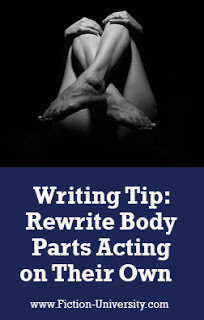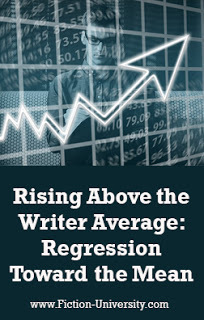Janice Hardy's Blog, page 79
March 28, 2019
Rejection. What Gives? As if Writing a Book Wasn’t Hard Enough, Right?
 By Andrew Wood, @andrewtheauthor
By Andrew Wood, @andrewtheauthorPart of The Writer’s Life Series
JH: Writers face rejection every day, and some days are harder to face than others. Please help me welcome Andrew Wood to the lecture hall today to share his thoughts on rejection and how a writer can turn them to their advantage.
Andrew Wood’s first novel, Storm of Fury, was recently published through Inkshares. He’s been pursuing his dream job as a writer for five years, and devotes his time to writing novels and honing his craft. He loves stories, whether they be books, movies, video games or comics, and he’s always on the hunt for more. Andrew grew up on books like Redwall, the Wheel of Time and Harry Potter, and from stories like these his love of writing grew. Now he works full-time to tell the stories he has in his heart, and finally force them on to paper where they belong.
You can find him on Patreon under his name, where he releases monthly horror, fantasy and sci-fi short stories.
Twitter | Patreon
Take it away Andrew…
Continue ReadingWritten by Janice Hardy. Fiction-University.com

Published on March 28, 2019 05:20
March 27, 2019
Using Story Archetypes to Find Your Plot
 By Janice Hardy, @Janice_Hardy
By Janice Hardy, @Janice_HardyStory archetypes are useful tools to develop a novel or story.
Although we hear about characters archetypes a lot in writing, I’ve found story archetypes much more useful when developing a story. They’re solid jumping off points to help shape an idea and figure out the best direction to take it.
Story archetypes are the common events or situations often seen in fiction. Coming of age, rags to riches, the quest, getting retribution, earning redemption, battle of the underdog. They’re classic story types readers have come to recognize and even seek out.
Some story archetypes offer clear tropes and plots to follow, while others are more thematic, fitting whichever style or process a writer has. Those looking for more direction might welcome a trope-laden archetype, while those looking for general inspiration might prefer the theme-laden side. For example:
Continue ReadingWritten by Janice Hardy. Fiction-University.com

Published on March 27, 2019 05:20
March 26, 2019
When Fiction Doesn’t Work—What Can Be Learned?
 By Bonnie Randall
By Bonnie Randall Part of the How They Do It Series
JH: You can learn just as much from a bad book as a good book.
Stephen King said “Unless you read, you do not have the tools to write.”
Books that whisk us deeply into a story, have characters who become dear friends, or use language in such a way that leaves us breathless, are powerful tools for writers, because those elements are replicable and take our fiction to higher, deeper, and more meaningful levels.
What, though, about fiction that doesn’t move you in any sort of positive way? Can writing lessons be gleaned from these pieces also?
Continue ReadingWritten by Janice Hardy. Fiction-University.com

Published on March 26, 2019 04:23
March 25, 2019
How to Get an Extra Novel Written in a Year
 By Janice Hardy, @Janice_Hardy
By Janice Hardy, @Janice_Hardy Getting more books written is the goal of many writers, but finding the time to write more can be challenging.
Like many writers, I have a list of book ideas I want to write. Some are nothing more than basic premises, while others have decent outlines and are just about ready to go. The problem with this well of ideas, is that I don’t have time to write them all—even when I love the idea and want to write it.
Over the last several years I’ve spoken of a middle grade fantasy I've wanted to work on. I’ve had other obligations and other books in the works, and this project kept getting pushed back. But a few months ago, I got an opportunity to “sneak” this project into my writing schedule.
I joined a critique group.
Continue ReadingWritten by Janice Hardy. Fiction-University.com

Published on March 25, 2019 06:14
March 24, 2019
Sunday Writing Tip: Rewrite Body Parts Acting on Their Own
 By Janice Hardy, @Janice_Hardy
By Janice Hardy, @Janice_Hardy Each week, I’ll offer a tip you can take and apply to your WIP to help improve it. They’ll be easy to do and shouldn’t take long, so they’ll be tips you can do without taking up your Sunday. Though I do reserve the right to offer a good tip now and then that will take longer—but only because it would apply to the entire manuscript.
This week, check for disembodied eyes, hands, fingers, heads, and feet acting on their own.
While we understand what we mean to say, sometimes we write phrases that come across as a body part doing something all on its own. Eyes dart around rooms, feet wander the streets, hands reach for things—often with unintentionally comic results.
If the body part sounds like it’s a separate entity from the character, and you’re not trying to instill that feeling, consider revising.
For more on avoiding inadvertently funny body parts in your novel, try this article:
Breakaway Body Parts: Are Your Characters' Body Parts Acting on Their Own?Written by Janice Hardy. Fiction-University.com

Published on March 24, 2019 05:21
March 23, 2019
Real Life Diagnostics: Does This Scene Make You Care About the Protagonist?
 Critique By Janice Hardy, @Janice_Hardy
Critique By Janice Hardy, @Janice_HardyReal Life Diagnostics is a weekly column that studies a snippet of a work in progress for specific issues. Readers are encouraged to send in work with questions, and we diagnose it on the site. It’s part critique, part example, and designed to help the submitter as well as anyone else having a similar problem.
If you're interested in submitting to Real Life Diagnostics, please check out these guidelines.
Submissions currently in the queue: Two
Please Note: As of today, RLD slots are booked through April 13.
This week’s questions:
Does this scene make you care about Nicole? Is there enough conflict to draw you in? Do you hear Nicole's voice and personality? Is the problem clear?
Market/Genre: Christian YA Contemporary
Note: This is a significant and well-done rewrite of previously submitted material. If you’d like to see how the author revised this, find the others drafts in May 2018 and July 2018.
On to the diagnosis…
Continue ReadingWritten by Janice Hardy. Fiction-University.com

Published on March 23, 2019 06:12
March 22, 2019
What's at Stake? How to Make Readers Care About Your Story
 By Janice Hardy, @Janice_Hardy
By Janice Hardy, @Janice_Hardy This week's Refresher Friday takes an updated look at making readers care about your story. Enjoy!
Like many writers, I have story ideas languishing in my files that I really like, but haven't been able to make work yet because they don't have an answer to the "who cares?" question: Why should the reader care about this person and this problem? Until I figure out a way to make the stakes personal, to make me care, those stories will stay languished.
I know I'm not alone in this. I do a lot of critiques for a wide variety of writers. One of the most common comments I make is about the stakes. Why does this matter? Why should the reader care? Often I can see the stakes in the story, but they're general and vast, so they don't make me care. The author could put any protagonist into the lead and nothing about the consequences really changes.
Continue ReadingWritten by Janice Hardy. Fiction-University.com

Published on March 22, 2019 03:00
March 21, 2019
Rising Above the Average as a Writer: Regression Toward the Mean
 By Dario Ciriello
By Dario Ciriello Part of The Writer’s Life Series
JH: So much of publishing success is blind luck, and getting lucky twice (or more) can be harder than getting published in the first place. Dario Ciriello is back at the podium today to share thoughts on keeping success going.
We all want to succeed at our writing and produce that breakout book that hits big. And it is possible, for all of us. But it’s also necessary to understand success comes with its own challenges.
Not at first, of course. Faced with a sudden, maybe unanticipated hit, a writer, musician, or other creative will be overjoyed and exuberant. Recognition, validation, even money: what’s not to like?
But once the wave crests and the initial happy surprise gives way to considering the next project, that’s when apprehension can set in, and with good reason: how do you do it again?
Continue ReadingWritten by Janice Hardy. Fiction-University.com

Published on March 21, 2019 05:22
March 20, 2019
A Fun Test to Check Your Scene's Narrative Drive
 By Janice Hardy, @Janice_Hardy
By Janice Hardy, @Janice_HardyDusting off an oldie but goody for today. Here's a fun diagnostic quiz from 2011 to help you determine if your plot is doing its narrative job or just laying there without direction.
It's not an uncommon situation: You've finished your book, it's well written, the story is good, but for some reason the plot is just laying there, and you don't know what to do to make it better. It's not bad, but it's not making anyone eager to read it either.
Knowing a book isn't working and not knowing why can be horribly frustrating. I've had my share of flat stories, and I've found that when things aren't clicking, it's usually one of two things--lack of narrative drive (goals) or lack of stakes. Often a blend of the two, since they're very connected.
Continue ReadingWritten by Janice Hardy. Fiction-University.com

Published on March 20, 2019 03:00
March 19, 2019
3 Good Reasons Not to Quit Your Night Job
 By Maggie Wells, @MaggieWells1
By Maggie Wells, @MaggieWells1Part of The Writer’s Life Series
JH: Finding time to write is an issue nearly every writer faces, no matter where they are in their writing journey. Maggie Wells visits the lecture hall today to share some thoughts on managing a writing life, and tips to balance work, life, and writing.
Maggie Wells is a deep-down dirty girl with a weakness for hot heroes and happy endings. By day she is buried in spreadsheets, but at night she pens tales of people tangling up the sheets. The product of a charming rogue and a shameless flirt, this mild-mannered married lady has a naughty streak a mile wide.
Fueled by supertankers of Diet Coke, Maggie juggles fictional romance and the real deal by keeping her slow-talking Southern gentleman constantly amused and their two grown children mildly embarrassed. The author of over forty published works, she believes in love without limits.
Website | Twitter | Facebook
Take it away Maggie…
Continue ReadingWritten by Janice Hardy. Fiction-University.com

Published on March 19, 2019 06:36



